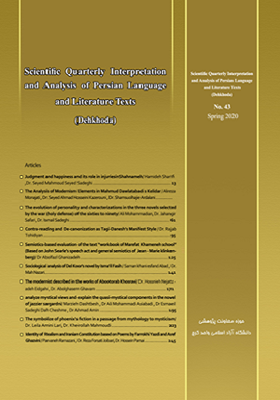Sociological analysis of Del Koor's novel by Isma'il Fasih
Subject Areas : Persian language and literature textssaman khani esfand abad 1 , Mah Nazari 2 *
1 - PhD student in Persian Language and Literature, Karaj Branch, Islamic Azad University, Karaj, Iran.
2 - Associate Professor of Persian Language and Literature, Karaj Branch, Islamic Azad University, Karaj, Iran
Keywords: sociological criticism, اسماعیل فصیح, Lucien Goldmann, novels, میخائیل باختین, Mikhail Bakhtin, نقد جامعه شناختی, لوسین گلدمن, جورج لوکاچ, György Lukács, رُمان, دل کور, روبرت اسکارپیت, Del Koor, Isma’il Fasih, Robert Escarpit,
Abstract :
The sociology of literature is the study of literary texts from a sociological point of view that illustrates the relationship between literature and social elements. In fact, this type of analysis examines the interplay between literature and society. A different reading of literary work is a two-way process between author and reader. It is important because literary traditions seek for absolutism of meaning, a one-dimensional view that the modern man does not tolerate, and in some way disgusts the reader. But critiques based on sociology as a new analysis make the reader's mind link to different aspects of the text's aesthetics. To this end, the novel by Isma’il Fasih Del Koor, which covers various prominent periods of Iranian history, including the years of Pahlavi rule and the constitutional revolution(Enghelabe Mashrouteh), has been critiqued sociologically to illustrate the relation of literature to the environment and social classes of that era. In this study, we first outline the theories of critique of sociology of literature and categorize sociological components from Goldmann, Lukacs, Bakhtin, and Escarpit's viewpoints and then apply them to the context of the author's intended community so that we can understand the life style of people, classes Different societies, especially the weak and low-income classes, their occupations, women's social status and their deprivation, historical issues, social infrastructure, lack of health, prevalence of diseases and famines, use of traditional medicine in lieu of up-to-date treatments, social injuries , Poverty, Prostitution, Rape, Violence, Usury, Acid Spraying, Religious Beliefs, Popular Beliefs Yeah, we better understand the superstitions of that era and ... It should be noted that this research has been done by "descriptive - analytical" method.
کتاب ها
مقاله ها
_||_

